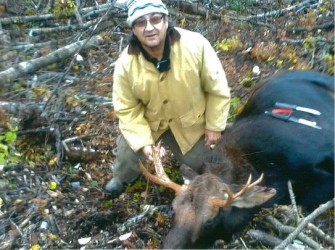Article Origin
Volume
Issue
Year
When Marvin Belcourt lay for hours, injured and in pain, waiting for medical help, he had no vision of what the future held for him. As an independent trucker for many years, he had supported his family and enjoyed a good lifestyle. When he left his home in Grimshaw that morning in 2009, it was just another work day. But his career was about to end in an industrial accident in Fort Wrigley.
Belcourt didn’t get medical help for three and a half hours. “It was cold and snowing and there was a nursing station only a couple of hundred yards away but the nurses were not called until much later,” he said. The Métis man believes it was a combination of racial and personal prejudice that caused the delay. “I think it was because I was Native and I was severely injured and the workers who were present recognized that there was going to be a claim for compensation.”
Making the incident even more complex was the fact that Belcourt is an Alberta resident but the accident occurred in the Northwest Territories. He was transported to the nearest medical centre at Yellowknife almost 12 hours later, with many months of further hospitalization and therapy ahead of him.
After the accident, Belcourt’s symptoms, which included cramping, loss of sense of taste and smell, and incontinence, continued. A thorough investigation raised the possibility of the onset of Kennedy’s Disease, a progressively debilitating hereditary disease that affects Aboriginal men. A mother who has a defective gene has a 50 per cent chance of passing on the disease to her sons.
“I want everyone to be aware of this motor neuron disease so men can be tested,” said Belcourt. “Doctors don’t always explore the research and testing that can identify its presence.”
While there is no cure for the Kennedy’s Disease, early treatment can slow the possible development of diabetes, frequent bouts of aspiration pneumonia, slurring of speech and muscle weakness.
Tests determined that Belcourt did not suffer from Kennedy’s Disease although the neurological damage from the accident was similar.
Today, Belcourt, at 62, remains unhappily at home while his wife Lynn works as an accountant for a provincial grocery operation. He draws only a tiny pension which in no way allows him to contribute his share of the income and he is grateful for Lynn’s love and care through these past years since he has been unable to work. His grown children live nearby and have been supportive.
“I get absolutely no support from any kind of workers’ compensation, even though I paid fees every year all the time I was working,” he said. Once the possibility of a motor neuron disease was identified, and a job-related condition appeared questionable, his support was dropped. “And I don’t get any provincially-based compensation either.”
Belcourt has engaged a lawyer. “I have filed my papers to sue the contractor and subcontractor and the Workers Safety and Compensation Commission for the Northwest Territories for negligence,” he concludes. “I hate to do this but I’m left with no alternative.”
- 3700 views

